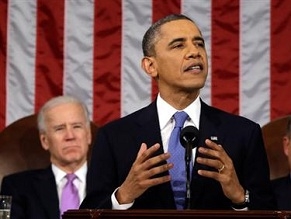|
World Jewish News

US President Barack Obama gives his State of the Union Speech to members of the Congress.
|
In State of the Union speech, Obama commits to ‘stand steadfast with Israel in pursuit of security and a lasting peace'
13.02.2013, Israel and the World US President Barack Obama briefly reflected on his forthcoming Israel visit in his State of the Union address Tuesday, as he committed to defending Israel’s security and seeking “lasting peace” in the Middle East.
He also vowed to focus on supporting the emerging democracies of the Middle East in his conversations with Israeli leaders, in the wake of 2011’s popular uprisings across the Arab world.
Extrapolating on issues of mutual concern to close ally Israel, Obama stressed that American values must be enlisted in the fight against terrorism, as he committed to leading “the effort to prevent the spread of the world’s most dangerous weapons,” invoking the ongoing Syrian crisis.
Calling for a realisation of the goal of mandatory universal human rights, he vowed: “We’ll keep the pressure on a Syrian regime that has murdered its own people, and support opposition leaders that respect the rights of every Syrian.”
“In the Middle East, we will stand with citizens as they demand their universal rights, and support stable transitions to democracy,” he added.
Cautioning that nuclear powers must comply with their international obligations, he hinted at America’s increasing frustration with Iran’s apparent lackadaisical attitude to international diplomatic efforts ahead of the next round of negotiations in Kazakhstan on February 26, as he insisted that “the leaders of Ira must recognise that now is the time for a diplomatic solution, because a coalition stands united in demanding that they meet their obligations, and we will do what is necessary to prevent them from getting a nuclear weapon”.
The so-called E3+3 powers scheduled to meet with the Iranian delegation for talks later this month include European members France, the UK and Germany and global players China, the US and Russia.
Last Thursday in a daily press briefing, US State Department spokesman Victoria Nuland said of the upcoming talks in Almaty that “we very much hope that when we have this opportunity in a couple of weeks, that the Iranians will come prepared to discuss real substance. Whether they prefer to do that in the P-5 -- with all of us in the room, whether they prefer to do that with all of us in the room and an opportunity to see us bilaterally, we’re open to whatever can take this forward. What’s most important is that they come prepared to really engage on the substance”.
Responding to recent Iranian calls for an easing of international sanctions in order to pave the way for substantive negotiations, she added: “As the Iranians well know, the ball is in the Iranians’ own court. The burden of these sanctions could be eased if they made a decision to engage with us substantively. We’ve always said that action on the Iranian side would be matched by action on our side. So it’s really up to Iran to engage if it wants to see sanctions eased.”
“We have had three rounds of talks already; this will be the fourth one. We’ve been disappointed that those have not yet resulted in real, concrete progress. We’ve also said that in the absence of progress, in the absence of movement, we would continue to ratchet up the international pressure. So as long as Iran fails to address the concerns of the international community, we’re going to have to continue to increase the pressure and isolate Iran internationally,” she said, referring to the itnenrational community’s preference for a twin track approach of diplomacy combined with sanctions in its dealings with Iran to date.
EJP
|
|
